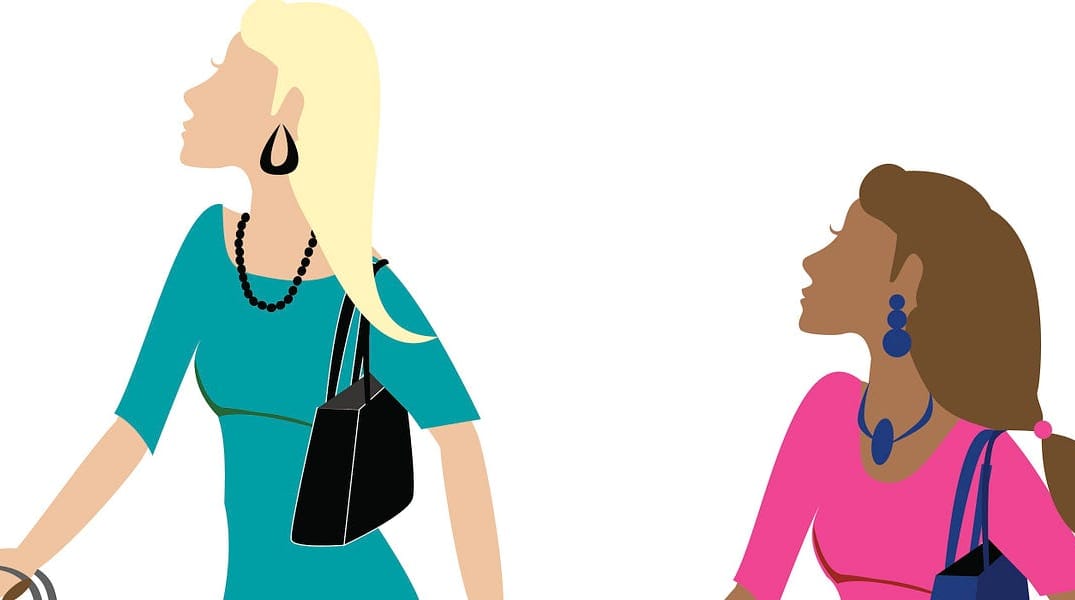By Angela Rodriguez Prilliman

I had minutes to make my decision. Not because the clerk was breathing down my neck, but because I really don’t like to hold people up. Having worked in the service industry throughout high school and college, I know how annoying it is when people come up to the counter but haven’t made their decision yet.
However, I wasn’t simply deciding between a blue or a green sweater. I was choosing either a Mexican last name or a white last name.
I had gotten so swept up in my wedding-planning process that I completely forgot that I would have to ultimately make the decision to remain a Rodriguez or become a Prilliman. I’m pretty traditional when it comes down to it, and I had always known I would take my husband’s last name when I eventually got married. But as I was filling out the marriage-license paperwork, reality sunk in.
If I went through with this name change, I would no longer have a Hispanic label attached to me.
As I stared at the blank space under “New Last Name,” I recalled all the times my Mexican name and heritage had influenced events or situations in my life, and I began weighing the pros and cons. I wish I could say it went differently, but there seemed to be more cons than pros that came with my Hispanic last name due to the racism my family and I have experienced for most of our lives.
I grew up in a small, predominantly white, rural town in central Texas that was known for rodeo, high school football and farms that smell like mounds of cow patties. When I was little, my dad worked on one of these farms. Originally from Monterrey, Mexico, he came to the United States chasing the American dream like many others. After getting married, my mom and dad moved to Stephenville specifically for a farming job opportunity. Given that I was only four or five at the time, I never thought twice about my dad working on a farm because it was all I ever knew.
I wish I could say it went differently, but there seemed to be more cons than pros that came with my Hispanic last name due to the racism my family and I have experienced for most of our lives.
But as I got older, I begin to notice commonalities: brown people worked on the farms, not white people. White people were the teachers, doctors and business owners, the people who lived in nice houses, not the kind with cracked linoleum floors peeling up like moldy cheese.
I couldn’t put my finger on exactly why white people had more access to things than Mexicans. I knew they had more money and seemed smart and important, but how did they get to be that way?
It was sometime in the fifth or sixth grade that I started looking for ways to mask my Mexican-ness. I mimicked the clothing choices of the preppy white girls, attempted to play sports and tried out to be a cheerleader, got competitive with academics and tried to maneuver social circles to prove to everyone I wasn’t like those “other Mexicans.” It worked to some extent; I was told multiple times throughout junior high and high school, “Oh, you’re not really Mexican; you’re white,” which I wore like a badge of honor. Because Mexicans got pregnant in high school; Mexicans did drugs and dropped out; Mexicans didn’t go to college; and I was not one of them.
But it didn’t matter what I was or what I wasn’t, because my last name wasn’t something I could hide on an application or a résumé. Years of striving to be different from a stereotype didn’t matter. The minute someone read or heard the name “Rodriguez,” they made assumptions — that I’m not educated, that I’m poor, that I’m promiscuous, that I’m unable to write well and that I’m someone who can’t be trusted.
There was a prominent family in my hometown known for being avid supporters of the community, who donated their time and money to school fundraisers and the like. They were seen as really nice people — until my sister started dating their son. One day my sister came home sobbing because this boy had broken up with her. His parents made it clear that it wasn’t acceptable to be seriously dating a Mexican girl. I was stunned. His parents had been so kind to us; I had thought they respected my family as equals. The son and my sister continued to see each other in secret for a little while, but the damage was done. Since then, whenever I introduced myself to the parents and grandparents of any white guy I dated, I couldn’t help but wonder, “Are they genuinely happy to meet me, or were they expecting someone else and are now praying that this doesn’t last?”
The minute someone read or heard the name “Rodriguez,” they made assumptions — that I’m not educated, that I’m poor, that I’m promiscuous, that I’m unable to write well and that I’m someone who can’t be trusted.
As much as politicians want to get that Hispanic vote, they’ve been the worst offenders when it comes to racism. I was the youth chair for a local mayoral race back in Texas. As part of that job, I organized an event in which other prominent politicians would be in attendance. One of these asshats at the event immediately assumed that I was the help and told me that it wasn’t my job to be talking to people; it was my job to bus tables and bring out more food. Speechless, I silently picked up the closest messy plate and walked away. I was so shocked and humiliated that I didn’t know what else to do. Because I didn’t want to let my candidate down, I swallowed the tears, put on my campaigning smile and continued with the event.
My generation isn’t much better, unfortunately. In a college class of mine, the topic of immigration came up. Not realizing there was a Mexican in his midst — because we couldn’t possibly go to universities alongside one — a classmate made a comment that Mexicans don’t deserve to be in this country and that they abuse the welfare system, eat up taxpayer money and don’t contribute anything to society as a whole. So apparently, my family and I should just get shipped back to Mexico because we are worthless to the United States. I wish I hadn’t, but I fired back at this guy, knowing that everyone in the room was probably thinking, “Oh, man, another aggressive Latina over here. Don’t get on this girl’s bad side!” I can’t even stand up for myself or people I care about without being looked at like the emotional Hispanic (my equivalent of the angry black woman).
With so many examples like these, it was really hard to come up with more than one good reason to keep my Hispanic name, outside of affirmative action. I’m fairly certain I earned most of the college scholarships my community offered because I was the ultimate trifecta: in the top 5 percent of my class, relatively lower income and Hispanic. But college is over. How would my Hispanic name help me today or in the future?
And if you needed any more evidence that people read cultural biases into names, a recent video came out about a Mexican who saw drastic results in responses to his job application once he changed his name to a traditionally white one. What’s funny is that I’d told my little brother to do the same exact thing years ago, because you can’t sound any more Mexican than Jose Rodriguez.
So when it comes down to it, I’ve experienced too many instances of discrimination, both subtle and overt, to justify keeping my last name.
Another thing weighing on me was my desire to continue to work in tech. And even with all the big tech companies releasing diversity reports and vowing to be different, employers tend to hire people who are like themselves. With so few Hispanic people in tech and in the corporate world in general, I wasn’t going to hold my breath anymore and hope for attitudes about race and ethnicity to change.
So when push came to shove, I changed my last name to Prilliman.
I saw the opportunity to appear “more white” and finally receive some of the advantages that come along with that change.
And I immediately was disappointed with myself.
My mental identity crisis went something like this: Your name is so bland now. How will people know that you have this fiery passion about you? What about all the other Latina women trying to make it in the world? You’ll never be an inspiring example to them! You have a massive, crazy family, and your name doesn’t match this anymore. You’ve become unrelatable to your people! Selena is rolling in her grave right now!
I saw the opportunity to appear “more white” and finally receive some of the advantages that come along with that change.
Nothing too noticeable has changed since I made the switch, though. I feel more comfortable in some social situations because people don’t judge me by my name before they meet me in person. But I still worry that I’m tricking people, and feel guilty that I’m doing something wrong by cloaking myself in a white name.
Luckily, changing back to Rodriguez is still a legal option should the conflict over my overt cultural identity push me in the opposite direction. But I’m not sure if I ever will go back to my Mexican last name.
In the meantime, if I want to add a little Rodriguez to my signature whenever I feel like it, I still can. And I do. Because I know that even with all the baggage that comes along with my Mexican name, it sometimes comes with great opportunities. Opportunities to change people’s minds.
Image from Thinkstock







